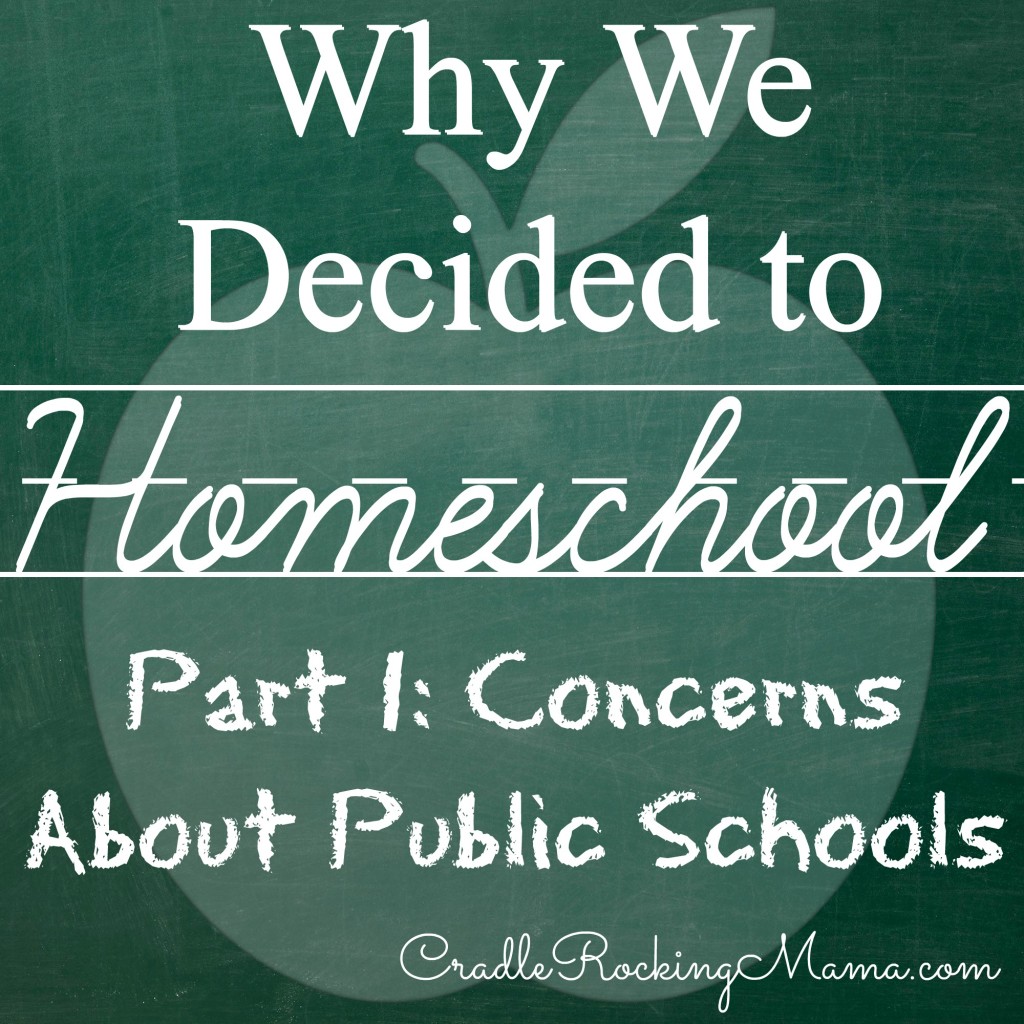This is the first post in the series “Why We Decided to Homeschool”. Since this was a joint decision, I asked Darrel to share his thoughts – especially about our first issue. Without further ado, and for his first appearance on my blog, here is what my husband has to say about his concerns about public schools:
Homeschooling vs. Public Schooling
We all want the best for our children. We want our children to be prepared to excel in life. We try to help our children grow into the best people that they can be. There are multiple routes to achieve this; for some it’s public schools and for others it’s homeschooling. This is by no means a condemnation of teachers and administrators at public schools, but rather a statement of the weaknesses in viewing education as a system.
My Mom was a public school teacher. I have many friends who work for public schools. I work at a public university. I considered becoming a teacher at various points in my life. My problem is not with the teachers.
My problem is with the laws, rules, and decisions regarding educational spending.
I feel that public schools do not focus on gifted artists and academics to the degree that they should. This includes all those extra-curricular programs that prepare our children for life such as 4-H, Quiz Bowl, FBLA, FFA, DECA, Gifted and Talented, and more.
A reason for homeschooling
There are many reasons to choose homeschooling for a child. One of the reasons that I have considered for years is the way education is applied by the public school system. My wording here is purposeful. Public schooling is a system and the overall course of education is dictated as a system – rather than plans for educations. The state and national programs do not take individuals into account and are geared toward ALL students at once. When applying education to all students the system must focus on groupings of students that need the most help to meet minimum requirements.
Goal seeking in public schooling vs. homeschooling
Primarily the public school system is interested in achieving specific goals. A certain percentage of children who meet a given criteria is the general format for these goals. This means that the system must focus on children who do not meet those goals, while ensuring that children already meeting them maintain their current level.
Through this goal seeking the public school system is pushing everyone to intellectual equality AT THE LOW END.
This is partially the fault of common culture. We spend more money per student on athletics than we do the arts and intellectually gifted because sports are more popular. I’m sure you can find articles about the likelihood of Johnny becoming a pro athlete rather than a well paid professional, but the bottom line is the latter is more likely. This means we are not spending to push the gifted beyond their current level. Are public schools required to have athletics programs? Are public schools required to meet academic standards? With homeschooling you can put the focus and seek the goals you want.
I’m sure someone is thinking “but, we do spend money on academics”. Yes, but our focus is not on academics, the focus is athletics and entertainment. This focus perpetuates the race to mediocrity.
Tailored education in homeschooling
The other part of the race to mediocrity is a focus on lower performing students. Too often the schools have an unrealistic set of goals and focus hard on meeting them. This means they siphon money from gifted programs to pull up the lower performers to meet those goals.
This means our schools aren’t pushing higher; they are not pushing for academic excellence.
They are pushing for the absolute lowest requirement.
With homeschooling we, as parents, can tailor to the educational needs of the individual rather than the whole.
A quick read through http://www.arkansased.gov/esea-flexibility gives an example of this. This page states that the state board of education in Arkansas is “targeting supports to any group that is not meeting its targets.”
I’m sure that any teacher or administrator at the level of personal interaction with students will tell you it’s about helping struggling students. The problem with that is the teachers are working within a system that isn’t interested in the individual, but in meeting overall goals for the whole. Those who already meet the goals are not specifically targeted for improvement.
Another line from this same page states that the accountability system “is particularly focused on intensive supports and interventions for schools that are struggling the most.”
With homeschooling you can focus on the needs of the child, not the entire systems areas of weakness.
For instance your child may be a whiz at math and this means tailoring their curriculum to advanced math while just meeting requirements for this student in other areas. The math whiz in a public school is going to be bored to tears by the repetitive nature of already mastered material.
Homeschooling is a way out of the SYSTEM
Homeschooling is a way out of the system and into real learning and education. Oh, the child will still be meeting the system standards, but they can do that at an accelerated pace. They can get through the system check-boxes and begin to specialize in whatever they want.
Carrie and I discussed this even before Jed was born. We both agreed that high school was boring most of the time. We were not challenged at the high school level. So by homeschooling we could skip all the boring for our children and let them specialize. Whether that specialization is as a plumber, electrician, mechanic, musician, engineer or research chemist, they can focus on what they want during the time of life when they have the real drive and support at home to do it.
Homeschooling and choices
The race to mediocrity in public schools is a great reason to choose homeschooling. Public schools slowly push everyone to the middle. With homeschooling you can educate your children so much faster and allow your child to start doing what they want earlier in life. The choice to homeschool means less time for the adult, but more time for the child.
(Carrie here again)
Obviously I agree with Darrel’s points. I also agree with his perspective on teachers. There are some truly excellent, life-changing teachers out there. These are the teachers that inspire, motivate, and encourage children to learn more than they know and become more than they are. These teachers are awesome!
These teachers are rare.
Equally rare, however, are the truly horrible teachers. The ones that make kids hate school, hate learning, and hate them. While I had more than my share of those rotten, stinking, awful teachers during my school years, I acknowledge that I was simply unlucky.
Most teachers are perfectly fine and adequate. Maybe even better than average.
So, as he said, our concerns about public schools do not stem from the teachers, but from the system itself.
For us, those concerns can be boiled down to two things. The teachers have no choice; they must: 1) follow the guidelines given them by state and federal authorities, no matter how ridiculous and unhelpful, and 2) do their best to teach without the ability to truly address the needs of each child.
Darrel basically addressed both of those points in his writing, since the reason the teachers cannot focus on the individual as much as they would surely like is because of requirements sent down from state and federal authorities, but I’d like to take the issue of guidelines a step further.
Public education in America has been, for all intents and purposes, completely taken over by federal mandates. While States still, theoretically, call the shots on many issues, the bottom line is money. If States want federal education funding, they must comply with federal rules. Period.
Most schools are woefully underfunded these days, even with the federal funding. There’s no way they are going to say ‘no’ to that money.
What that means is that all these brilliant, well-produced, strenuously vetted educational decrees (sarcasm) thought up by geniuses who have never tried to teach a class in their life become the road map our children must follow in school. Think “No Child Left Behind“. Think “Race to the Top“. Think “Common Core“.
While there are advocates for all of those endeavors, Darrel and I are not fans. We feel they hurt children more than help them.
Feel free to look this up for yourself to decide the matter on your own. There’s no shortage of commentary on all of them. (Try here, here, here, and here, for starters.)
From the beginning of my school years, the frequent testing to measure performance was frustrating. I was lucky to be an excellent test-taker, but many of my fellow students were not. They grew anxious and stressed out by the idea of taking a huge, federal test to measure how smart they were. It was distressing to observe.
Beyond that, even back in the 1980’s, we would often drop any and all actual education for weeks prior to a big, federally mandated test to simply work on “test preparation”.
There was no learning going on in the classrooms for the month preceding such a test. Only drilling to ensure we would score as high as possible, so the school wouldn’t lose funding.
That is hardly my idea of a wise way to spend time in a school.
Today, the situation is worse. Tests are more frequent and funding is even more directly tied to the test results. Children are “failing” tests that cannot possibly measure any true hallmark of learning. Teachers are frustrated that they cannot truly teach the way they would like to; the way they know the students need and deserve.
They are hamstrung by the federal regulations that are tied to the funding that keeps the school doors open at all. It’s a vicious Catch-22.
As for Part 2 of our concerns, that teachers must teach without being able to address the needs of each child, that is pretty self-explanatory.
A teacher with 30 children in her class simply does not have the time to truly focus on each child to ensure they get the attention they need. It’s not a failing of the teachers; it’s a logistical impossibility.
While that method has worked, to some degree or another, for a long time, it isn’t ideal and does little to ensure children reach their full potential.
As Darrel said, with Homeschooling, we can focus on our children and their strengths (and weaknesses) much more than would be possible in a public school environment.
Even with Homeschooling, there will still be tests for my kids to take that measure what they know. However, Darrel and I will have a much better understanding of whether our children are actually LEARNING than we would if they were in school most of the day.
With Homeschooling, our children will not waste hours, days, and even months of their lives drilling for tests that do nothing to enhance their individual education. They will spend every moment of their actual school time doing what all parents hope their kids will do: learn to think, learn to reason, and learn to love learning.
“Ah, but school isn’t just about learning!” I can hear some of you thinking. “School is about learning to function in the world and socialize with other kids!”
I’ll address that concern in tomorrow’s post.
Read the whole series:
Part 1: Concerns About Public Schools
Part 2: Socialization
Part 3: Food Issues
Part 4: The Little (Big) Things
Whether you Homeschool or not, do you also have concerns about the frequent tests, the lack of personal attention to the children, and the ever-changing mandates passed down from government in our schools?












We home school. Join HSLDA. We started homeschooling while my husband was a teacher. SC is a pretty good state for home school. I just graduated my 1st of 6. Whoohoo! It is hard, but good. I have a lot of thoughts and opinions. Feel free to contact me with any questions.
I’m so happy to hear from a happy homeschool mom! Darrel and I actually joined HSLDA last month when we bought the curriculum. I’d love to chat about your experiences!
Pingback: Why We Decided to Homeschool Part II: Socialization - Cradle Rocking Mama
Homeschool wasn’t an option for us, so we chose Option #3 – parochial school. The Lutheran school Brady attends is small (one classroom per grade, average. class size is 15) and simply amazing. He’s in a pretty exceptional class, and the school has advanced their curriculum each year to challenge their abilities. We couldn’t be happier with our choice, but I’m already fretting about high school since there are no Lutheran high schools near us. We aren’t Lutheran, but I am grateful God led us there!!
Your school sounds awesome! It sounds like just the kind of place I’d love my kids to go if we couldn’t homeschool. You’re lucky…and I trust that God will help you find an amazing solution for high school. 🙂
Pingback: Why We Decided to Homeschool Part III: Food Issues - Cradle Rocking Mama
Pingback: Why We Decided to Homeschool Part IV: The Little (Big) Things - Cradle Rocking Mama
Homeschooling was the best thing we did last year. I wish we had done it sooner. My 5th grader has improved in all areas tremendously. My preschooler is reading and is enthusiastic about learning.
Both children are extremely social and outgoing. They make friends easily with children of different ages and opposite sex.
That’s fabulous! I’m so happy to hear stories like this. I’m convinced homeschooling can be a fantastic approach for people who are willing to try it. And some children just seem to need that kind of involvement. Congratulations!!
Pingback: Controlling the Meanies - Cradle Rocking Mama
Pingback: We Love Potatos!! - Cradle Rocking Mama
Pingback: Our First Month As Homeschoolers - Cradle Rocking Mama
Pingback: Looking Back: 2015 - Cradle Rocking Mama